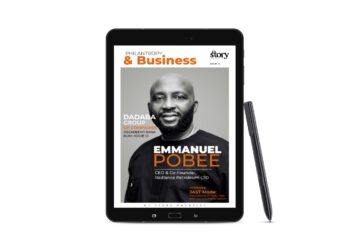Most startups need money. The source could be the largesse of the well-to-do owner. However, most small businesses depend on outside sources for funds.
John Armah has experience with the subject through his Orios Group holding company founded to create wealth. The business growth strategist and award-winning entrepreneur reviewed with We Talk Biz about the development and positioning of startups for financing.
Entrepreneurs well versed in their business have to know when their startup is ripe for investment.
“There’ll always be companies that will grow organically per a minimum viable product, and others that will require investment to grow,” Armah said. “There will always be companies that require an investment that have liabilities.
“However, the most important question to any of these businesses is — whether seed, early or otherwise — are you investment-ready, and what is your ‘investment thesis?’” he said.
Armah believes startup owners should answer these questions:
- Is my model viable?
- What is my market and its size – business to business, business to consumer or otherwise?
- What are my funding needs and type?
- Governance?
- Performance and financial management?
These determine the following:
- Is there a proof of concept?
- If not, what will the funds be applied to?
- Has the business considered the funding types and its requirements if they so choose debt or equity?
“The stage of business determines what type of funds that apply,” Armah said, but first know what stage a business is in.
“There are seed — pre-seed, seed and post seed — early stage and series cycles,” he said. “More importantly, capital raised, product development stage and generally the business structure and cash flow cycle determine the overall business stage.”
Startups can tap into several types of financing.

“The nature of the business determines the capital applicable,” Armah said. “Is the business export-oriented? Is it a seed-stage company? Typical of our market are credit lines, convertible debt, business angels, credit guarantees, grants, private equity debt or equity.
“Knowing the investor requirements, focus and type of model the business runs, that determines what capital should be applied for,” he said. “Typically, a grant should fund my proof of concept and will give a minimum viable product approach to ensure organic growth to merit rounds of funding from seed to series.”
Entrepreneurs need to know the fiscal requirements of their potential suitors.
“Most funds have specific sectors of interests,” Armah said. “They usually will demand a pitch document, information memorandum, market summary, capitalization table, financial plan, contracts, team profiles and track record even if it’s a green field. Startups miss out due to inexperience on these.
“The more information business owners can provide to financiers, the better.
“An investor wants to know if the business has enough data to validate its financial projections, its product and what is offered to the investor,” Armah said. “Has the business advanced enough to merit valuation to determine what is in it for the investor?”
Although entrepreneurs hear that they need innovative ideas, investment concepts by themselves can’t provide for consistent business.
“Business sustainability and consistency are a function of the structure, product, innovation capacity, capital and While business owners might worry about being too small for investment or financing, other factors are in play.

“Most startups forget that while you are selling potential, to any investor it is the return on investment, exit scenarios, team, product, governance, size or knowledge of the market that determines what and how much capital is made available,” Armah said.
Business models should be based on clear goals while keeping customers in mind.
“Such a model should be relative to the size of market, purchase patterns and products that consumers actually want, translated in sales and use,” Armah said. “A consumer’s problem may change, but understanding the customer’s lifetime value is critical to growth.”
Entrepreneurs also need to put on their best face for venture capitalists.
“These investors have specific sectors of focus,” Armah said. “Be sure your idea is a fit. The venture capitalist may be a minority or majority investor, so do your research. Determine the ticket sizes they do, past investments and requirements.”
He said business owners should do this:
- Court the investor and show value: Let your pitch show a clear problem and solution, benefits not features, tell a story, competitive advantage, competitor analysis, revenue model, risks, traction, performance metrics and indicators, team and what-if scenario.
- Have a capitalization table, information memo, financials and valuation including amortization schedule for debt financing, legal structure copies, contracts, demo product if you’ve built a prototype.
“Share the ask, and show what you will give for it,” Armah said. “As much as possible, there must be some owned intellectual property to make the startup definitive and unique. Tech startups and “What does cost schedule operating expense and capital expense look like relative to expansion or growth?” he said. “Are your customer acquisition costs high relative to potential revenue? Who makes up your team? Have you sufficiently advanced the product? Numbers? Not just potential, results?”

Although the average startup owner might not understand business or financial jargon, ignorance is no excuse.
“It’s really important to get help as much as possible in building your business case,” Armah said. “You can’t do it alone. Understanding the business jargon is the key to entry for raising capital or courting investors. It’s what investors want to hear.”
Investors and financiers look for specific things in small businesses and startups.
“You may be solving a problem as a startup, but the question is how big is that problem to size of the market?” Armah said. “Are consumers able and willing to pay for your solution? What’s the proof? What’s your route to market? How different are you? What are your expectations on return on investment?
“What are your business growth metrics?” he said. “Who has supported you in the past with funding or advisory? What stage are you at, and what type of capital is applicable? What sort of internal controls do you have? How regional or scalable can your product be?”
Knowing those answers will sharpen presentations.
“A good pitch is when you tell an investor, ‘I have put in X, built from point A to B,” Armah said. “These are my earnings, attracted X and Y, people. This is what I offer. These are who are using it. These are my competitors. This is what we do differently, plus plans for scale and risks.
“Grants are different,” he said. “Grant applications or tender processes are routes often ignored by startups, but are a key requirement on your growth or sustainability plans. Understanding what requests for proposals, requests for quotations, technical proposals and criteria look like is really important.”
Armah offered this advice for anyone on the journey of looking for financing and investment:
- Build your capacity. Get help to build governance and internal controls. Demonstrate proof of concept. Be focused. Don’t just chase public relations. Build functional products. Don’t chase every pitch competition in the world.
- Let people open doors for you. Raising capital is a patience game. You may outsource capital raising to firms. Focus on sales. Share your growth as much as possible. Have an impact model.
- Be different. Be unique. Be realistic and practical about what is possible. Don’t be idealistic. Build teams. Understand the dilution of shares. Understand the licensing requirements for your business and product.
“No one knows your business better than you,” Armah said.
“While others may agree to help, you must be coachable and trainable. Learn how to agree and disagree professionally. Not all funds will work for you. Partnerships don’t always work out.”
Of course, entrepreneurs should first make sure they really need funding. Then get what they are worth.
“When people tell you owning a piece of something is better than owning 100 percent of nothing, tell them No!” Armah said. “Tell them yielding control of the business can destroy your dreams. Knowing what partnership is right is the key to making that phrase true.
SOURCE : Jim Katzaman (https://www.datadriveninvestor.com/2019/06/03/startups-and-investors-seek-the-right-fit/ )
































